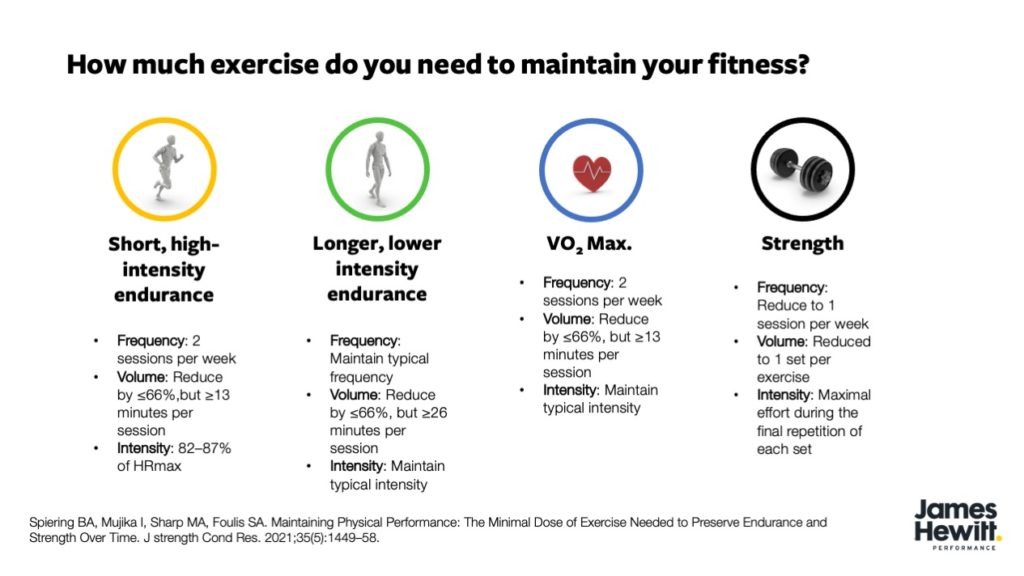Everyone has experienced times when they have limited time for exercise, but not many people are clear about how much training they need to do to maintain their fitness. A new review of the scientific literature indicates that the minimum amount of training required may be surprisingly low.
Performance, in both endurance and strength, can be reasonably well maintained, for up to 15 weeks, even if training frequency is reduced by 66% (e.g. reducing training 5 to 3 sessions per week), and training volume is reduced by 33-66% (e.g. the amount of weekly training drops from 6 hours to 2 hours, as low as 13–26 minutes per session), providing intensity is maintained.
This is great news for anyone who suddenly finds themselves with less time available, whether that’s because they are heading back to the office, for example, or if they are experiencing more work demands or other constraints on their time.

The review shares several practical guidelines:
To maintain short-term endurance (i.e., maximal bouts of exercise lasting ∼4–8 minutes) in general populations:
- Exercise frequency can be reduced to 2 sessions per week, as long as exercise volume and intensity are maintained; or:
- Exercise volume can be reduced by 66% (as little as 13 minutes per session), as long as exercise frequency and intensity are maintained; or:
- Exercise intensity can be reduced to ∼82–87% of HRmax, as long as exercise frequency and volume are maintained.
To maintain long-term endurance (i.e., maximal bouts of exercise lasting ∼1–3 hours) in general populations:
- The minimal exercise frequency is not known, so the author’s conservatively recommend maintaining exercise frequency at or near the individual’s typical training level.
- Exercise volume can be reduced by 33% (as little as 26 minutes per session), as long as exercise frequency and intensity are maintained.
- Exercise intensity must be maintained as high as reasonably possible (at least as high as the individual’s typical training intensity).
To maintain V̇o2max in general populations:
- Exercise frequency can be reduced to 2 sessions per week, as long as exercise volume and intensity are maintained; or:
- Exercise volume can be reduced by 66% (as little as 13 minutes per session), as long as exercise frequency and intensity are maintained.
- Exercise intensity must be maintained as high as reasonably possible (at least as high as the individual’s typical training intensity).
To maintain strength in general populations:
- Exercise frequency can be reduced to 1 session per week.
- Exercise volume can be reduced to 1 set per exercise.
- The authors conservatively recommend an exercise intensity that results in maximal effort during the final repetition of each set (or maintaining the exercise load at least as high as the individual’s typical training level).
To maintain muscle size in younger (∼20–35 year old) general populations:
- Exercise frequency can be reduced to 1 session per week.
- Exercise volume can be reduced to 1 set per exercise.
- The authors conservatively recommend an exercise intensity that results in maximal effort during the final repetition of each set (or maintaining the exercise load at least as high as the individual’s typical training level).
To maintain muscle size in older (∼60–75 year old) general populations:
The author’s conservatively recommend:
- Exercise frequency of 2 sessions per week.
- 2–3 sets per exercise.
- Exercise intensity that results in maximal effort during the final repetition of each set (or maintaining the exercise load at least as high as the individual’s typical training level).
References
Spiering BA, Mujika I, Sharp MA, Foulis SA. Maintaining Physical Performance: The Minimal Dose of Exercise Needed to Preserve Endurance and Strength Over Time. J strength Cond Res. 2021;35(5):1449–58.





